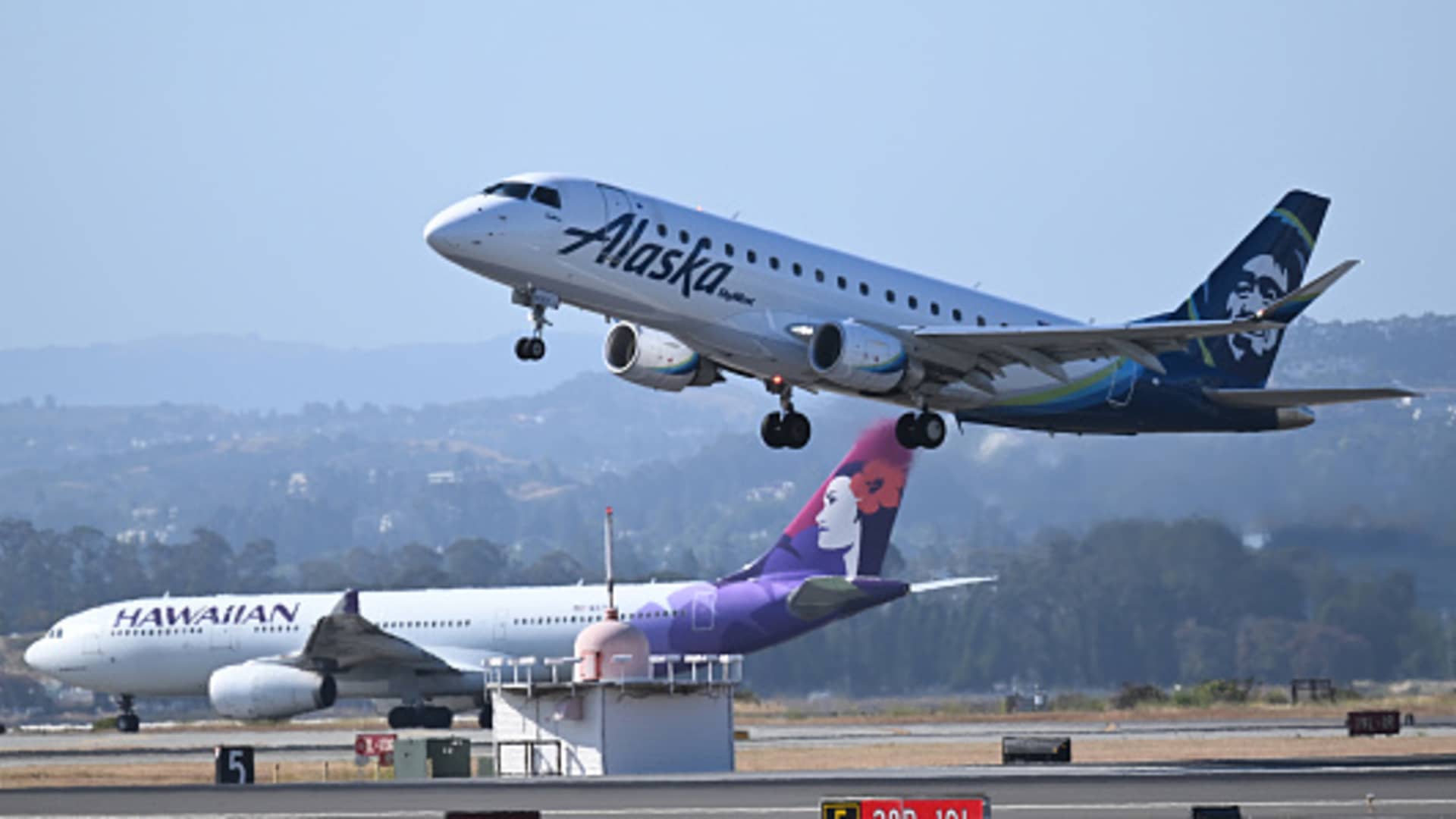Alaska and Hawaiian Airlines planes takeoff at the same time from San Francisco International Airport (SFO) in San Francisco, California, United State
Alaska and Hawaiian Airlines planes takeoff at the same time from San Francisco International Airport (SFO) in San Francisco, California, United States on June 21, 2023.
Tayfun Coskun | Anadolu Agency | Getty Images
President Joe Biden’s Justice Department has successfully had two airline link-ups halted in court in recent months. That doesn’t necessarily spell doom for Alaska Air’s plan to buy Hawaiian Airlines.
U.S. District Court Judge William Young on Tuesday sided with the Justice Department and blocked JetBlue Airways‘ $3.8 billion attempted takeover of Spirit Airlines, saying that the elimination of the budget carrier known for rock-bottom fares would “harm cost-conscious travelers” who rely on those cheap tickets.
The decision immediately sparked questions of whether an Alaska-Hawaiian combination would suffer a similar fate in an antitrust lawsuit. Shares of Hawaiian plunged in the minutes after the ruling was handed down, though they ultimately recovered.
“We’d be lying to ourselves if we thought the probability of a successful merger had not been lowered following [Tuesday’s] ruling,” Deutsche Bank airline analyst Michael Linenberg wrote in a note on Wednesday.
Yet the pitfalls that brought down the Spirit-JetBlue deal may offer clues into how Alaska and Hawaiian could pass muster with regulators, or in court. The Justice Department didn’t immediately respond to a request for comment about whether it plans to challenge Alaska and Hawaiian’s proposed deal.
“The court in the JetBlue case was plainly concerned that this merger was eliminating a low-price carrier,” said Herbert Hovenkamp, a law professor at the University of Pennsylvania’s Carey Law School and a specialist in antitrust law.
“What that says about Alaska-Hawaii, their advisors [and] lawyers are going to have to make sure that they can avoid those problems,” he said.
JetBlue and Spirit jointly said they disagreed with the decision and were considering next legal steps, which could include an appeal.
Different kind of deal
Alaska and Hawaiian executives have expressed confidence in their nearly $2 billion deal, which includes Hawaiian’s debt.
“The decision involving other airlines does not impact our plans to combine with Hawaiian Airlines,” an Alaska Airlines spokeswoman said in a statement on Thursday. “Our deal combines two airlines with complementary networks and we believe the transaction will enhance competition and expand choice for consumers.”
Alaska agreed in December to purchase Hawaiian, which was reeling from a sharp drop in bookings in the wake of the Maui wildfires, increased competition in its home market from Southwest and a slow recovery in Asia travel.
JetBlue argued it needed to buy Spirit to better compete with the largest airlines, which control about 80% of domestic capacity, a dynamic that resulted from years of megamergers.
In the case of JetBlue and Spirit, Judge Young took issue with scores of overlapping routes. The carriers had offered divestitures to solidify the deal, but to no avail.
While Alaska and Hawaiian’s combination won’t be a breeze with regulators, the two deals are quite different.
Alaska and Hawaiian said in an investor presentation last month that they would have less than 3% overlap in their combined networks, which would include more than 1,300 daily flights.
“From a competitive standpoint, I think that lands really, really well,” said Alaska CEO Ben Minicucci on a Dec. 3 call with analysts after announcing the merger.
JetBlue had planned to remodel Spirit’s bright-yellow and tightly-packed planes its own, which offer fewer seats, more legroom, and other amenities.
Alaska, in contrast, has said it plans to keep the Hawaiian and Alaska brands separate. Alaska did away with the Virgin America brand after it bought that carrier in 2018.
“Not a single material point raised by the court, in our opinion, in ruling against the JBLU/SAVE merger directly applies to the Alaska deal to buy Hawaiian,” JPMorgan airline analyst Jamie Baker wrote after the Tuesday ruling.
DOJ challenge
That doesn’t mean the Justice Department won’t launch the effort, however.
Biden’s DOJ is already two-for-two against airline deals, after a separate U.S. District Court judge in May sided with the Justice Department to undo JetBlue’s partnership with American Airlines in the U.S. Northeast, an alliance that won government approval during the final days of the Trump administration.
That agreement allowed JetBlue and American to coordinate routes and schedules in the Northeast, where they argued congested airports and airspace made it difficult to compete against bigger rivals.
The Justice Department successfully argued the partnership was anticompetitive, and the airlines last year ended the agreement, though American has announced it will appeal the decision.
Still, the department is fresh from another victory in court, which Hovenkamp said may “invigorate them to try to challenge [Alaska-Hawaiian] as well.”
Minicucci said last month that the airlines expect closing the deal will take 12 to 18 months. Some analysts, however, say the Justice Department’s win against JetBlue-Spirit will cast a shadow on Alaska’s deal.
“The reality is, even if you think everything’s going to be fine, the probability of the deal has to be lower than it was” before the JetBlue-Spirit ruling, said Conor Cunningham, an airline analyst at Melius Research.
www.cnbc.com

COMMENTS